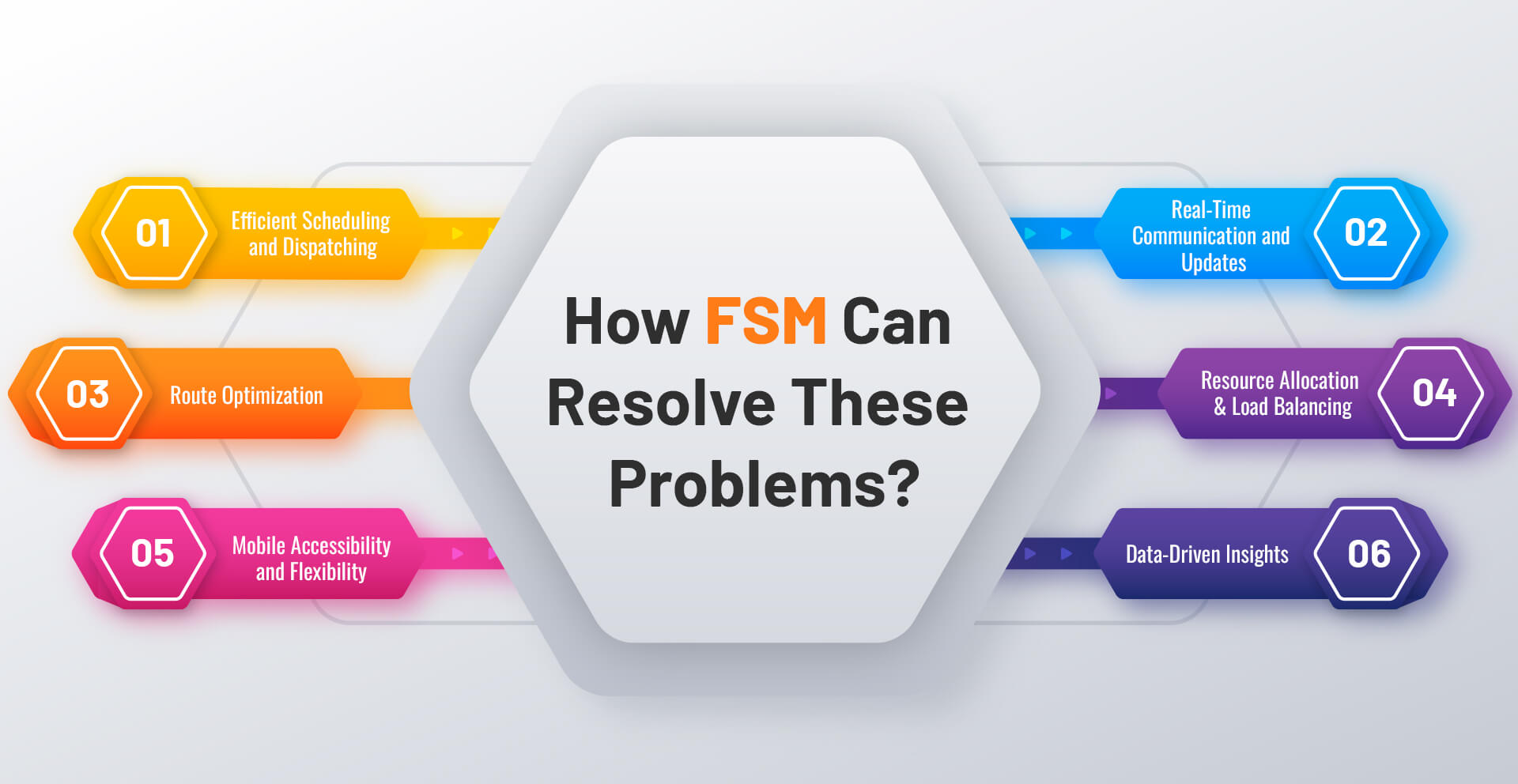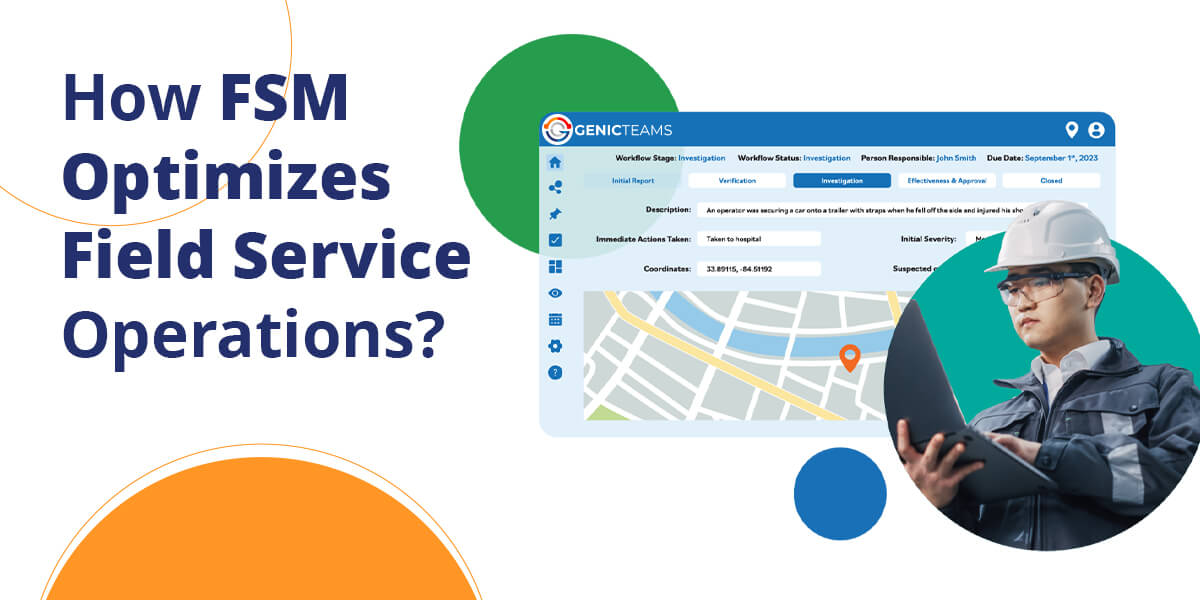Field service teams often face the challenge of managing operations across vast geographical areas. Whether it’s equipment repairs, inspections, or routine maintenance, the efficiency of field service operations can significantly impact a company’s success.
Let’s explore how geographical constraints affect operations and how field service management system technology can offer effective solutions.
What is Field Service Operations?
Field service operations cover a wide range of industries. These operations involve sending technicians, engineers, or other specialists to customer sites for maintenance, repair, or installation work. Companies in utilities, telecommunication, healthcare, and manufacturing are examples of the types of organizations that rely heavily on their field service teams.
However, managing these teams is challenging due to various factors. These include coordinating schedules, tracking performance, managing inventory, and ensuring the quality of work. To streamline operations and overcome these hurdles, companies are increasingly turning to FSM systems.
With an FSM system, companies can make sure that workers have all the information and tools they need, no matter where they are. This way, customers are taken care of faster and better.
Geographical Constraints and Travel Time Optimization
Managing field service teams over large distances presents several hurdles. Technicians traveling long distances to service locations face increased travel time and operational costs. Expenses like fuel, vehicle maintenance, and potential delays add up quickly. Unpredictable factors such as traffic, weather, and road conditions can further irritate these issues, leading to extended travel times.
Extended travel not only reduces the number of jobs a technician can complete in a day but also impacts customer satisfaction. Clients expect timely service, and delays due to travel can lead to frustration and negative reviews. Moreover, the strain of long hours on the road can cause technician fatigue, reducing their performance and overall productivity.
Geographical constraints also contribute to uneven workload distribution. Technicians in high-demand areas may be overwhelmed, while those in less busy regions might have idle time. This imbalance can result in inconsistent service quality and decreased employee satisfaction.
How FSM Can Resolve These Problems

Field service management (FSM) systems and software have revolutionized field service operations by addressing these geographical challenges. Here’s how FSM technology can optimize travel time and improve field service efficiency:
1. Efficient Scheduling and Dispatching
FSM systems use real-time data and intelligent algorithms to automate scheduling and dispatching. Rather than relying on manual job assignments, FSM software can assign tasks to the nearest available technician. This reduces travel time and allows technicians to reach their destinations more quickly, completing more jobs each day.
FSM systems also consider traffic patterns, road closures, and other variables that may affect travel. This dynamic scheduling ensures that technicians are not only assigned the closest jobs but also the most efficient routes, boosting overall productivity and meeting customer expectations for timely service.
2. Real-Time Communication and Updates
Field service management apps enable real-time communication between the back office and field technicians. This persistent link enables real-time notifications on job status, scheduling changes, and unexpected complications. For example, if a technician meets heavy traffic or a roadblock, they can notify the dispatch team, who can change schedules or reroute accordingly. This flexibility lowers downtime and keeps the team working.
Real-time updates also enable companies to provide customers with accurate ETAs, enhancing the customer experience. Knowing exactly when a technician will arrive builds trust and reduces the frustration associated with long wait times.
3. Route Optimization
FSM software excels in route optimization. By analyzing factors such as distance, traffic, and technician availability, FSM tools suggest the most efficient routes for each technician. This not only saves time but also reduces fuel consumption and vehicle wear, lowering operational costs.
Additionally, FSM systems can group nearby jobs, allowing technicians to handle multiple tasks in the same area without unnecessary travel. This approach maximizes efficiency, allowing technicians to focus more on their work and less on driving.
4. Resource Allocation and Load Balancing
FSM systems optimize resource allocation, ensuring even distribution of work among technicians. By analyzing job locations, technician availability, and skillset, FSM tools prevent any single technician from being overloaded. This balanced approach leads to consistent service quality and effective utilization of all team members.
FSM systems can also predict peak times and allocate additional resources accordingly. During busy periods or in high-demand areas, companies can deploy extra technicians to meet demand and ensure prompt job completion. This proactive approach helps maintain high service standards and avoid delays.
5. Mobile Accessibility and Flexibility
FSM apps provide technicians with mobile access to job details, customer information, and route directions. This accessibility allows technicians to make informed decisions in the field and adapt quickly to changing circumstances. If a technician finishes a job early, they can immediately check the app for their next assignment, minimizing downtime and maintaining a steady workflow.
Mobile accessibility also improves communication with customers. Technicians can update clients on arrival times, report job completion, and even collect digital signatures on-site, enhancing transparency and streamlining the service process.
6. Data-Driven Insights
FSM systems provide significant data-driven insights to help businesses optimize their field service operations. Companies can optimize their operations by examining data on travel times, work durations, technician performance, and client feedback.
For example, if data reveals that certain routes consistently cause delays, companies can investigate alternative paths or adjust schedules accordingly. Similarly, if a technician consistently completes jobs faster than others, their methods can be studied and shared with the team to improve overall efficiency.
Final Words
Geographical constraints and travel time optimization are significant challenges for field service operations. However, with the right tools and strategies, these challenges can be effectively managed. Field service management system offer solutions that optimize scheduling, enhance communication, and leverage data-driven insights to improve overall efficiency.
Companies that use FSM technology may lessen the impact of geographical limits, save travel time, and ensure that their field service staff work at optimum performance. This increases technician productivity while also improving customer happiness and lowering operating costs.
At Genic Teams, we specialize in providing advanced FSM solutions that help businesses overcome distance challenges and optimize their field service operations. By partnering with Genic Teams, your company can stay ahead of the competition and deliver exceptional service to customers, no matter where they are located.









